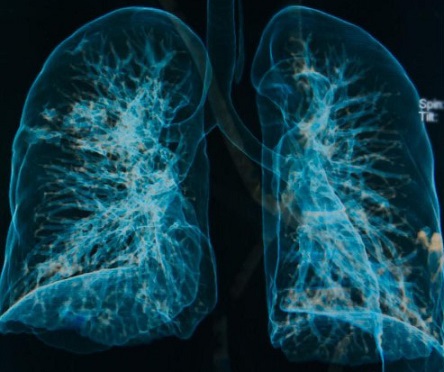Measles After Flu Or Any Other Respiratory Infections Can Result In Severe Lung Damage!
Nikhil Prasad Fact checked by:Thailand Medical News Team Feb 09, 2024 1 year, 2 months, 2 weeks, 3 days, 5 hours, 4 minutes ago
Medical News: In recent research conducted by the Center for Translational Antiviral Research at Georgia State University, a startling connection between measles, influenza, and severe lung damage has been unveiled. The study focused on ferrets, which were initially infected with a common respiratory virus such as influenza or respiratory syncytial virus. Following their recovery, these ferrets were exposed to a non-lethal strain of canine distemper virus (CDV), closely related to the human measles virus. Astonishingly, the ferrets developed lethal hemorrhaging pneumonia, indicating a cascade of severe lung complications.
 Measles After Flu Or Any Other Respiratory Infections Can Result
Measles After Flu Or Any Other Respiratory Infections Can Result
In Severe Lung Damage
Unprecedented Lung Failure
The researchers, led by Dr Richard Plemper, the senior author of the study, discovered that consecutive infection with two non-lethal respiratory viruses led to acute lung failure in the ferrets. This was an unprecedented revelation, challenging the conventional understanding of viral infections. The ferrets did not succumb to the viral infections but rather to bacterial pneumonia. The compromised immune response made the animals unable to prevent the invasion of the lungs by commensal bacteria, leading to severe complications.
The Role of Trefoil Factors
To delve deeper into the underlying mechanisms, the researchers conducted screenings for differences in gene expression between animals infected with influenza and those that were not. The study found that infection with the canine distemper virus resulted in the expression of a group of protective host proteins in the lung called trefoil factors. These proteins, including TFF1, TFF2, and TFF3, play a crucial role in maintaining mucociliary bacterial clearance and preventing bacterial pneumonia.
Dr Robert Cox, the first author of the study, told Thailand
Medical News that after recovering from influenza, the levels of trefoil factors were not upregulated in the ferrets. This left the animals vulnerable to usually harmless bacteria. When exposed to CDV, the decrease in the levels of these protective host proteins led to the development of severe bacterial pneumonia.
Experimental Antiviral Drug
In a significant breakthrough, the researchers utilized an experimental antiviral drug, developed by Dr Plemper in recent work. This drug proved effective in preventing lethal bacterial pneumonia even when administered late after CDV infection. The findings offer a glimmer of hope for potential therapeutic interventions to mitigate severe complications associated with measles-like diseases.
Measles and Immune Amnesia
Dr Plemper emphasized the potential implications for human health, stating that while it is not yet known whether the measles virus causes enhanced disease following unrelated earlier viral infections, the study adds to concerns about the resurgence of measles globally. Measles is often followed by bacterial complications such as otitis media or bacterial pneumonia. The viral disease his
tory of a child could be an underappreciated risk factor for developing these secondary sequelae.
The study not only sheds light on the severity of diseases resulting from consecutive infections but also identifies a window of opportunity to treat viral infections and prevent long-term immune suppression associated with measles-like diseases. Dr Cox highlighted the dual significance of the research, stating that besides discovering the role of previous infections in disease severity, the study provides a novel option to mitigate severe complications.
Therapeutic Mitigation and Immune Competence
The research team explored therapeutic mitigation of measles-like immune amnesia and exacerbated diseases after prior respiratory virus infections in ferrets. The study utilized a canine distemper virus-ferret model as a surrogate for measles and employed an orally efficacious paramyxovirus polymerase inhibitor to address questions related to immune memory preservation through antivirals.
The results demonstrated the benefits of treatment with GHP-88309 for over seven days after the therapeutic vaccination window had closed. This introduces a novel option to mitigate severe complications of measles-like diseases, providing hope for enhanced immune competence even in the later stages of infection.
Measles Resurgence and Global Impact
The resurgence of measles cases globally, compounded by the challenges posed by the COVID-19 pandemic, has heightened concerns about the health risks associated with delayed vaccination and interrupted healthcare services. Over 40 million children worldwide are at risk of measles due to these factors, emphasizing the urgency to understand the complexities of measles infections and their potential interactions with other respiratory viruses.
The Impact of Respiratory Disease History
The research also delves into the impact of prior respiratory disease history on the severity of morbillivirus infection. The ferret model revealed that prior infection with influenza significantly increased the risk of severe complications, leading to fatal hemorrhagic pneumonia. The findings underscore the importance of considering a patient's respiratory disease history as a crucial factor in predicting and managing the outcomes of viral infections.
Conclusion
In conclusion, the comprehensive study conducted by the Center for Translational Antiviral Research at Georgia State University has unraveled significant insights into the interactions between influenza, measles, and severe lung damage. The identification of trefoil factors as protective host proteins and the successful use of an experimental antiviral drug offer promising avenues for future therapeutic interventions.
The research not only contributes to our understanding of the immune response to viral infections but also provides valuable information for public health strategies, especially in the context of measles resurgence and the challenges posed by global pandemics. As the scientific community continues to unravel the complexities of viral interactions, these findings pave the way for potential breakthroughs in the treatment and prevention of severe respiratory infections.
The study findings were published in the peer reviewed journal: Nature Communications.
https://www.nature.com/articles/s41467-024-45418-5
For the latest
Medical News, keep on logging to Thailand
Medical News.
